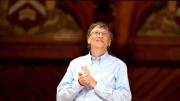Microsoft founder Bill Gates ’77, LL.D. ’07, one of Harvard's best known dropouts, spoke to a large crowd of students at Sanders Theatre on April 21. In a talk titled "Giving Back: Finding the Best Way to Make a Difference," he asked, "Are the brightest minds working on the most important problems?" and exhorted the audience to tackle areas like poverty, energy, food productivity, sustainability, and especially, global health and American education. (The Bill and Melinda Gates Foundation, which has become Bill Gates's primary responsibility since he stepped down as Microsoft CEO two years ago, accents global health and education in its work.)
Gates showed a chart tracking a steady decline, over the past 50 years, in the number of children under five years of age who perish annually worldwide, and noted that even though economic gains, seen in rising gross domestic products, have affected this by improving nutrition, the lion's share of the change came from vaccination. He pointed out that since 1975, in American public education, "there's been no improvement, and other nations are doing better than we are," despite the fact that per-capita U.S. expenditures on education are considerably higher than those of other countries. Gates said an important under-researched question is: What makes a great teacher? Before his talk, he made a surprise appearance at a Teach for America reception at the Graduate School of Education. In his Sanders remarks, he noted with approval that 324 Harvard seniors, no less than 18 percent of the class, had applied to Teach for America.
A report in the Boston Globe's business section detailed some of his views on commercial questions as well as public-health initiatives; the Harvard Crimson's story also recounted some of his interchanges with audience members.









